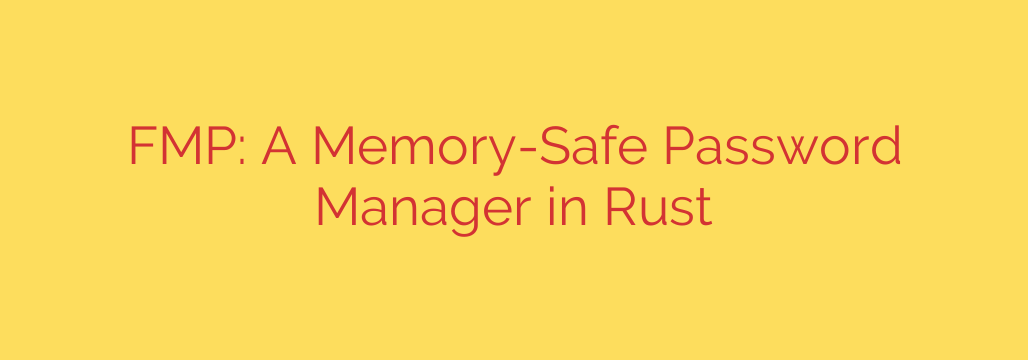
The Future of Digital Security: Why Memory-Safe Password Managers Are Essential
In today’s digital world, a strong password manager is no longer a recommendation—it’s a necessity. These tools are the guardians of our digital lives, securing everything from bank accounts to personal emails behind a fortress of encryption. But what if the very foundation of that fortress has a hidden weakness? Many popular applications are built using programming languages that, despite their power, can introduce subtle but critical vulnerabilities related to memory management.
This is where a new generation of security tools, built with memory-safe languages like Rust, is changing the game. By addressing security at the most fundamental level, these applications offer a more robust defense against sophisticated cyberattacks.
The Hidden Threat of Memory Vulnerabilities
For decades, many of the world’s most critical software applications have been written in languages like C and C++. While incredibly powerful, these languages require developers to manually manage how the program uses computer memory. A single mistake can lead to dangerous security flaws.
Two of the most common and dangerous types of memory-related bugs are:
- Buffer Overflows: This occurs when a program tries to write more data into a memory block (a “buffer”) than it can hold. The excess data overflows, potentially overwriting adjacent memory. Attackers can exploit this to inject malicious code and take control of a system.
- Use-After-Free: This happens when a program continues to use a piece of memory after it has been freed (or deallocated). This can lead to unpredictable behavior, data corruption, or allow an attacker to execute arbitrary code.
Major tech companies report that around 70% of their critical security vulnerabilities are caused by these memory safety issues. Even with rigorous code reviews and testing, these bugs can slip through, leaving even the most secure-looking applications exposed.
Rust: Building a Stronger Foundation for Security
This is the problem that the Rust programming language was designed to solve. Rust provides a revolutionary approach to memory management that eliminates these dangerous vulnerabilities by design.
The key is Rust’s compiler, which acts as a vigilant security guard before the program is ever run. It enforces a strict set of ownership and borrowing rules that mathematically prove the code is memory-safe. If a developer makes a mistake that could lead to a buffer overflow or a use-after-free bug, the program simply will not compile.
This means that an entire class of the most common and dangerous security vulnerabilities is eliminated at the source. It’s a proactive approach to security, building safety into the code’s DNA rather than trying to patch holes after the fact.
What Makes a Memory-Safe Password Manager Different?
When these principles are applied to a password manager, the result is an exceptionally secure tool. A memory-safe password manager provides all the features you expect but with an added layer of foundational security that is difficult to replicate in other languages.
Key features of a truly secure, modern password manager include:
- A Zero-Knowledge Architecture: The service provider should never have access to your unencrypted data. Your master password is the only key, and it is never transmitted to a server.
- Proven, Modern Encryption: Your data should be protected with industry-standard encryption algorithms like AES-256-GCM, which provides both confidentiality and data integrity.
- Strong Key Derivation: The encryption key derived from your master password should be generated using a slow, memory-hard algorithm like Argon2. This makes it incredibly difficult for attackers to guess your master password using brute-force attacks.
- Open and Auditable Code: The best security tools are often open-source, allowing security experts from around the world to inspect the code for any potential flaws.
A memory-safe password manager built in Rust offers all of this, plus the compile-time guarantee that it is free from the memory bugs that plague so much other software.
Actionable Steps to Enhance Your Security
Protecting your digital identity requires a proactive approach. While choosing the right tools is critical, good habits are just as important.
- Choose Your Tools Wisely: When selecting a password manager or other security software, prioritize applications that are open-source and transparent about their security design. Those built in memory-safe languages offer a distinct, foundational advantage.
- Create a Formidable Master Password: Your master password is the key to your entire digital kingdom. Make it long (at least 16 characters), complex, and utterly unique. A memorable passphrase is often stronger and easier to remember than a random string of characters.
- Enable Multi-Factor Authentication (MFA) Everywhere: MFA adds a critical layer of security by requiring a second form of verification, such as a code from your phone. Enable it on your password manager and every other account that supports it.
- Keep Your Software Updated: Developers constantly release patches to fix security vulnerabilities. Ensure your operating system, browser, and all applications are always running the latest version.
Ultimately, the security of our digital lives depends on the integrity of the software we use. By understanding the importance of foundational security concepts like memory safety, we can make more informed choices and better protect ourselves from the threats of tomorrow.
Source: https://www.linuxlinks.com/fmp-password-manager/








